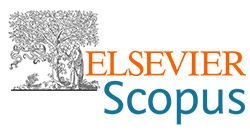Influence of different methods of surface treatment on corrosion resistance of low-alloy steel
DOI:
https://doi.org/10.62638/ZasMat1052Abstract
The influence of mechanical methods of surface treatment (polish and polish with the next strengthening by high-frequency mechanical pinning, HFMP) on the corrosion resistance of low-alloy steel 15HSND were presented. The deficiencies of surface strengthening by HFMP with one impact peen were analyzed, and an instrument in which shock elements are situated in a few rows was suggested. Speed of HFMP for the surfaces 35 sm2/min was recommended. The differences in structure and microhardness of near-surface layers of 15HSND steel with polished surface and the polished surface with next strengthening by HFMP were established after investigations in the salt frog chamber and moisture chamber during 1200 hours. Application of HFMP technology increases of corrosion resistance of steel: corrosion rate after neutral salt fog decreased from 2,543 mm/year on the polished surface to 2,096 mm/year after HFMP treatment, and after increased humidity and temperature, from 0,104 mm/year to 0,080 mm/year.
Keywords:
accelerated climatic tests, corrosion resistance, high-frequency mechanical peening, low-alloy steel, metallographyReferences
Mhaede, M. (2012) Influence of surface treatments on surface layer properties, fatigue and corrosion fatigue performance of AA7075 T73, Materials & Design, 41, 61-66.
https://doi.org/10.1016/j.matdes.2012.04.056
Bogdanowicz, Z.W., Nasiłowska, B.M., & Wojucki, M. (2015) Shot peening effect on 904 L welds corrosion resistance, Journal of Constructional Steel Research, 115, 276-282.
https://doi.org/10.1016/j.jcsr.2015.08.041
Ahmed, A.A., Mhaede, M., Wollmann M., & Wagner, L. (2014) Effect of surface and bulk plastic deformations on the corrosion resistance and corrosion fatigue performance of AISI 316L, Surface and Coatings Technology, 259, 448-455.
https://doi.org/10.1016/j.surfcoat.2014.10.052
Gao, W., Wang, D., Cheng, F., Deng, C., Liu, Y., & Xu, W. (2015) Enhancement of the fatigue strength of underwater wet welds by grinding and ultrasonic impact treatment, Journal of Materials Processing Technology, 223, 305-312.
https://doi.org/10.1016/j.jmatprotec.2015.04.013
Balusamy, T., Narayanan, T.S., Ravichandran, K., Park, I. S., & Lee, M.H. (2013) Influence of surface mechanical attrition treatment (SMAT) on the corrosion behaviour of AISI 304 stainless steel, Corr. Sci., 74, 332-344.
https://doi.org/10.1016/j.corsci.2013.04.056
Mordyuk, B.N., Prokopenko, G.I., Vasylyev, M.A., & Iefimov, M.O. (2007) Effect of structure evolution induced by ultrasonic peening on the corrosion behavior of AISI-321 stainless steel, Materials Science and Engineering: A, 458 (1-2), 253-261.
https://doi.org/10.1016/j.msea.2006.12.049
Kuhlmann, U., Durr, A., Gunther, H. P., Bergmann, J., Thumser, R., Gerth, U., & Gerster, P. (2005) FACHBEITRAGE-Verlangerung der Lebensdauer von Schweisskonstruktionen aus hoher festen Baustahlen durch UIT-Technologie, Schweißen und Schneiden, 57 (8), 384-392.
Mordyuk, B.N., Prokopenko, G.I., Vasylyev, M.A., & Iefimov, M. O. (2007) Effect of structure evolution induced by ultrasonic peening on the corrosion behavior of AISI-321 stainless steel, Materials Science and Engineering: A, 458(1-2), 253-261.
https://doi.org/10.1016/j.msea.2006.12.049
Dong, Z., Liu, Z., Li, M., Luo, J.L., Chen, W., Zheng, W., & Guzonas, D. (2015) Effect of ultrasonic impact peening on the corrosion of ferritic-martensitic steels in supercritical water, Journal of Nuclear Materials, 457, 266-272.
https://doi.org/10.1016/j.jnucmat.2014.11.028
Abdullah, A., Malaki, M., & Eskandari, A. (2012) Strength enhancement of the welded structures by ultrasonic peening, Materials & Design, 38, 7-18.
https://doi.org/10.1016/j.matdes.2012.01.040
Kravtsov, T.G., Sevryukov, V.V.(2001) Ultrasonic treatment of ship parts and welded structures. Monograph, Nikolaev, UGMTU. 216 p.
Lobanov, L.M., Kirian, V.I., Knysh, V.V., & Prokopenko, G.I. (2008) Improvement of fatigue resistance of welded joints in metal structures by high-frequency mechanical peening, The Paton Welding Journal, 9, 2-8.
Degtyaryov, V.A., Shulginov, B.S., & Knysh, V.V. (2009) Deformation criterion of the efficiency of strengthening of welded joints by high-frequency mechanical peening, The Paton Welding J, 10, 39-41.
Knysh,V.V., Solovej S.A. and Bogajchuk, I.L. (2011) Optimisation of the process of strengthening of welded joints of 09G2S steel by high-frequency mechanical peening, The Paton Welding Journal, 5, 20-24.
Knysh, V.V., Osadchuk, S.O., Solovei, S.O., Nyrkova, L.I., and Rybakov, A.O. (2019) Procedure of accelerated corrosion testing for modeling the long-term effect of moderate climate atmosphere on welded joints, The Paton Welding Journal, 11, 44-49.
https://doi.org/10.15407/tpwj2019.11.08
Feng, Y., Hu, S., Wang, D., & Cui, L. (2016) Formation of short crack and its effect on fatigue properties of ultrasonic peening treatment S355 steel, Materials & Design, 89, 507-515.
https://doi.org/10.1016/j.matdes.2015.10.009
GOST 9.908-85. Unified system of corrosion and ageing protection. Metals and alloys. Methods for determination of corrosion and corrosion resistance indices.







